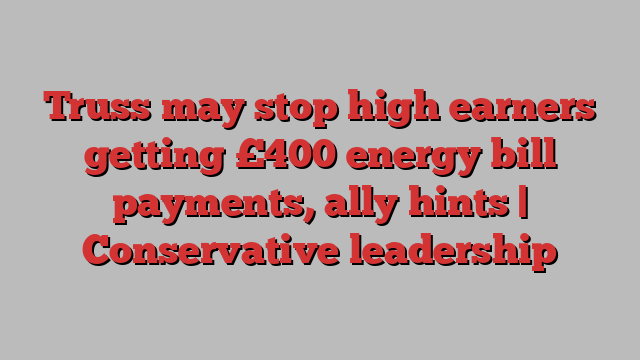
One of Liz Truss’s key ministerial allies has hinted she might stop wealthy people receiving the £400 energy bills payout coming from the Treasury later this year.
The chief secretary to the Treasury, Simon Clarke, said he found it “pretty odd” that high earners would benefit from the payments, which were announced in May by Rishi Sunak, the then chancellor, as part of a £15bn energy support package.
Clarke was speaking in an interview with the Sunday Telegraph in his capacity as an advocate for the Truss campaign, which over the past week has been revising its stance on energy bills and seeking to quash suggestions that Truss is opposed to offering those most in need targeted support.
Clarke was Sunak’s deputy in May when the Treasury announced that from October every household would get the £400 payments, mostly paid in instalments as rebates on energy bills. This was the universal element in a package that diverted most of the extra £15bn available to payments for those most in need.
In his interview, Clarke said: “I do find it pretty odd that high earners are receiving £400 off their bills. As Conservatives, we ought to surely believe in targeting taxpayer money as best we can so that we actually achieve the best value and keep the burden on the exchequer as low as we can.
“It is not an ideal outcome, putting it very mildly, that people who don’t need it are receiving quite substantial sums of money from the state. That is not, frankly, a targeted package, is it?”
At the start of the Tory leadership campaign, Truss suggested the main measures she would implement as prime minister that might help people with rising energy bills would be the reversal of the national insurance rise and the temporary removal of green levies on energy bills.
Truss brushed aside complaints that these measures would do little to help those most in need – and that the national insurance cut would help high earners most – and in an interview with the Financial Times this month she appeared to rule out one-off payments to those most in need. “I would do things in a Conservative way of lowering the tax burden, not giving out handouts,” she said when asked what she would do about energy bills.
But that remark was seen as a mistake, and within days Truss was stressing that she was offering people targeted support with energy bills. Clarke’s interview suggests the Truss campaign is trying to present itself as even more in favour of targeted support than Sunak, who defends the universal £400 payments.
Two of Truss’s key supporters – the former work and pensions secretary Iain Duncan Smith and Thérèse Coffey, the current work and pensions secretary – are reportedly urging her to use universal credit as a means of getting extra help with energy bills to those most in need.
The Truss campaign has not said she would definitely stop wealthy people getting the £400 payments, or how that might be achieved. Universal payments are easy to administer; means testing is much more complicated and best managed through the benefits system.
In his interview, Clarke attacked another of Sunak’s policies as chancellor – his decision to give UK backing to a G7-supported plan for a minimum corporation tax of 15%. “There is no question whatever that we didn’t come out of the European Union to fetter our discretion on issues like that,” Clarke said.
Truss agreed, he claimed. “I know she would not allow her government to find itself artificially constrained,” he said.